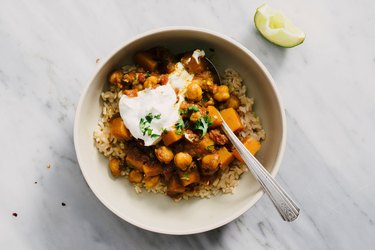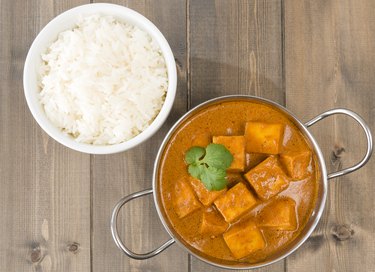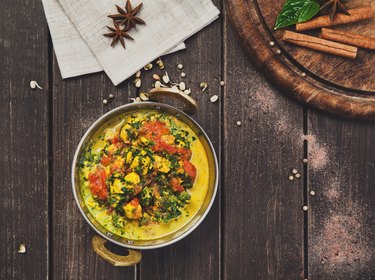
Abundant in vegetables, whole grains, legumes and other protein-rich foods, vegetarian Indian food can be a great option if you're trying to avoid meat but still want a healthy, satiating meal.
Do you want to lose weight or be healthier? Join MyPlate Calorie Counter and get access to free meal plans, healthy recipes and at-home workouts. You'll also get daily calorie and macro goals for your fitness journey. Don't miss your chance for amazing results. Sign up today!
Video of the Day
Video of the Day
In fact, a 2009 study published in Diabetes Care reports that people following vegetarian diets generally weigh less than non-vegetarians. Here's a list of protein-rich foods for vegetarians commonly used in Indian cuisine — plus some flavorful, healthy Indian vegetarian recipes to get you started.
1. Legumes
Legumes are common ingredients in Indian vegetarian recipes (often listed with a name containing "dal" or "matar"). They're not only packed with fiber, iron, phosphorous, potassium and B vitamins, they're also rich in protein. Some common legumes found in vegetarian Indian dishes include:
Chana masala is a flavorful North Indian curry made with tomatoes, onions, spices and chickpeas. Paired with rice, it's a great source of complete protein for vegetarians.
Protein content: 1/2 cup of cooked lentils provides almost 9 grams of protein and 1/2 cup of cooked chickpeas contains about 7 grams of protein

2. Dairy
Many dairy foods in a protein-rich diet are commonly incorporated into vegetarian Indian dishes. Calcium-fortified non-dairy substitutes, such as soy milk and soy yogurt, are also excellent sources of protein. You can expect to see these ingredients in popular Indian dishes:
- Milk
- Yogurt
- Paneer
- Chhena
- Gulab jamun
- Kheer
- Ghee
Raita is a popular Indian condiment made with yogurt, cucumber, and spices like coriander, cumin and curry. And paneer, a fresh cheese common in Indian cuisine, can be cooked into a delicious sauce or gravy, often with tomatoes, onions, garlic, spinach and spices.
Protein content: one cup of milk or soy milk provides about 8 grams of protein, 1 cup of low-fat yogurt contains about 13 grams of protein and paneer contains about 7 grams of protein per ounce
Read more: 10 Ways to Eat Healthy at Indian Restaurants
3. Tofu and Soybeans
If you want a dairy-free alternative to paneer, consider tofu — also known as bean curd — which is a plant-based complete protein that makes an excellent addition to vegetarian Indian dishes.
Tofu is also rich in polyunsaturated fatty acids, including omega-3 fats, which makes it heart-healthier than high-fat meats containing saturated fat. Many dishes also feature soybeans (edamame), which also contain lots of protein and healthy fats.
Protein content: 1/2 cup of firm tofu contains about 10 grams of protein
4. Nuts and Seeds
Various types of nuts and seeds are excellent sources of plant-based protein. In addition to being protein-rich, nuts are also excellent sources of heart-healthy fats, dietary fiber and vitamin E. The most common nuts in vegetarian Indian foods are:
- Cashews
- Almonds
- Walnuts
- Pistachios
- Pumpkin seeds
If you're worried about keeping your blood pressure in check, choose unsalted nuts.
Protein content: one ounce of almonds, or about 23 whole almonds, provides about 6 grams of protein, while a 1-ounce portion of cashews contains just over 4 grams of protein
5. Grains
Though not as high in protein as some of the other foods on this list, grains do contain some protein. And what's more, when combined with other vegetarian proteins like lentils, they create complete proteins, meaning they provide all essential amino acids that our bodies can't produce on their own. Some examples include:
- Barley
- Millet
- Wheat germ
- Brown rice
- Basmati rice
- Buckwheat
- Quinoa
- Amaranth
- Sorghum
Protein content: one cup of barley contains 3.5 grams of protein and 1/2 cup of cooked quinoa contains 4 grams of protein
6. Vegetables
Though it ranks lowest in protein, there is still some protein in certain vegetables. And in many vegetarian Indian dishes, veggies are the star. That's because they're relatively inexpensive compared to meats and are nutrient-dense, meaning that they have a high concentration of vitamins and minerals and a lower calorie count. A few veggies you may find in an Indian dish include:
- Brussels sprouts
- Cauliflower
- Eggplant
- Artichokes
- Beets
- Mustard greens
- Spinach
- Turnip greens
- Broccoli
- Mushrooms
Protein content: one cup of Brussels sprouts contains 3 grams of protein and one cup of cauliflower contains 2 grams of protein

14 Protein-Rich Indian Food Recipes
Ready to put this list of high-protein vegetarian Indian ingredients to good use? Throw on an apron, whip out your pots and pans and get ready to take your taste buds on a culinary journey.
- Start with a good chana masala, which is a vegetarian Indian staple. (8 grams of protein per serving)
- Moong dal is an aromatic dish of dal (lentils), spinach and spices. (7 grams of protein per serving)
- Another lentil dish, savory lentil chili with cumin cream is full of flavor and protein. (19 grams of protein per serving)
- This vegan curry sunrise scramble made with tofu gives eggs a run for their starring role on the breakfast table. (16 grams of protein per serving)
- Swap tofu for chicken in this classic tikka masala recipe. (12 grams of protein per serving)
- Try saag paneer — a classic vegetarian Indian dish that combines paneer and spinach. (17 grams of protein per serving)
- For a simple, flavorful snack toss roasted almonds with rosemary and garlic — like in this recipe. (6 grams of protein per serving)
- An Indian-spiced eggplant and mozzarella salad is a great addition to any meal. (8 grams of protein per serving)
- Switch things up with this Indian sweet potato edamame stew. (8 grams of protein per serving)
- Can't get enough sweet potato? Try this curry sweet potato and rice salad. (6 grams of protein per serving)
- For something sweet, whip up this lemon almond chai dessert. (7 grams of protein per serving)
- If you need some soup, cook up this high-protein coconut curry pumpkin soup. (3 grams of protein per serving)
- Or opt for this red lentil coconut soup. (13 grams of protein per serving)
- Puree some dal for this delicious zucchini mango salad with cilantro chutney. (7 grams of protein per serving)
Read more: 8 Curry Bowl Recipes That Will Warm Your Soul
- Diabetes Care: Type of Vegetarian Diet, Body Weight and Prevalence of Type 2 Diabetes
- U.S. Department of Agriculture National Nutrient Database for Standard References: Basic Report: 16070, Lentils, Mature Seeds, Cooked, Boiled, Without Salt
- U.S. Department of Agriculture National Nutrient Database for Standard References: Basic Report: 16057, Chickpeas (Garbanzo Beans, Bengal Gram), Mature Seeds, Cooked, Boiled, Without Salt
- U.S. Department of Agriculture National Nutrient Database for Standard References: Basic Report: 16126, Tofu, Firm, Prepared With Calcium Sulfate and Magnesium Chloride (Nigari)
- Academy of Nutrition and Dietetics: Strength Building and Muscle Mass
- U.S. Department of Agriculture National Nutrient Database for Standard References: Basic Report: 12061, Nuts, Almonds
- U.S. Department of Agriculture National Nutrient Database for Standard References: Basic Report: 12085, Nuts, Cashew Nuts, Dry Roasted, Without Salt Added